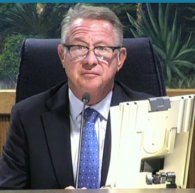GUHSD SUPERINTENDENT MIKE FOWLER TAKES LEAVE DUE TO BRAIN CANCER; BOARD APPOINTS SANDRA HUEZO AS ACTING SUPERINTENDENT
Source: Grossmont Union High School District
January 17, 2025 (El Cajon) -- Superintendent Mike Fowler has announced plans to step aside from his duties until March 1, 2025, as he receives treatment for a malignant brain tumor. After his diagnosis, Fowler underwent a successful surgery in December. He has now begun a rigorous treatment schedule which will require him to remain on leave through February. As a result, the Grossmont Union High School District (GUHSD) Governing Board took official action during a January 16 Special Governing Board meeting to appoint Sandra C. Huezo as Acting Superintendent.

 "I see this as disrespectful from you, the Council, the Mayor and the attorneys...This is going to create a lot of distrust in the community.” -- Jose Cruz, photo, left
"I see this as disrespectful from you, the Council, the Mayor and the attorneys...This is going to create a lot of distrust in the community.” -- Jose Cruz, photo, left